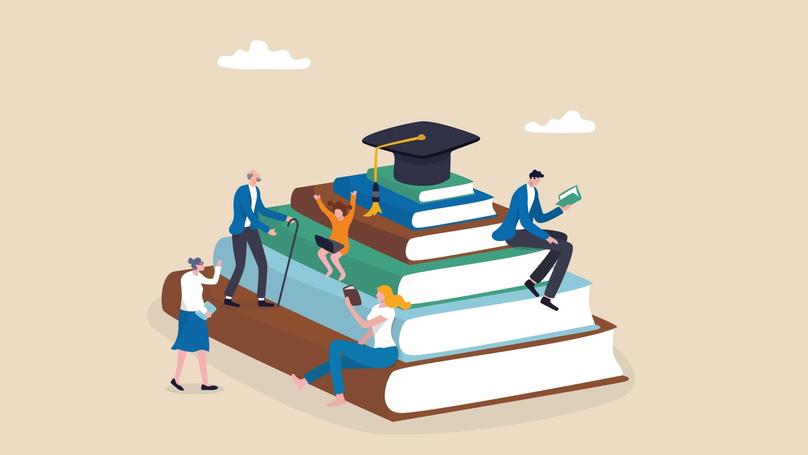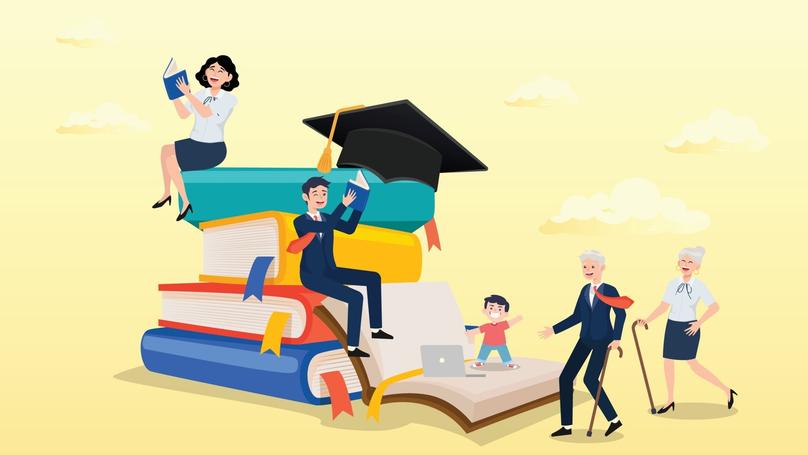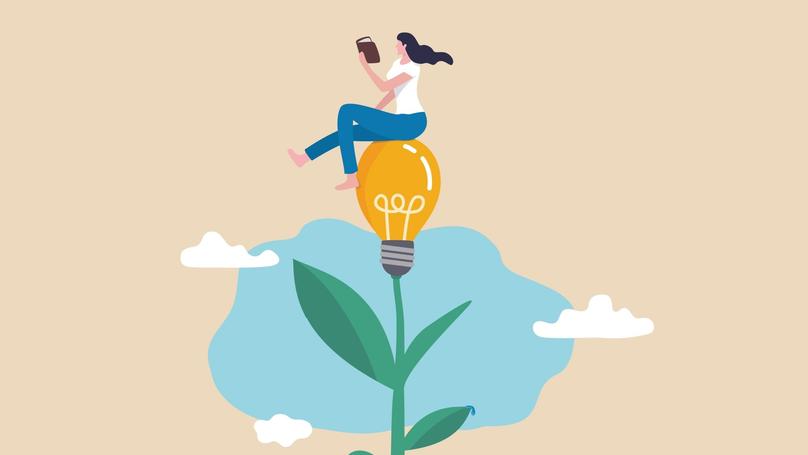Lifelong learning

What is lifelong learning?
Lifelong learning is the definition of an approach to education or the concept that learning lasts a lifetime and is a continuous process integrated into the daily routine. It represents both a mindset and an ideology centred on self-improvement. As a global trend fuelled by rapid technological progress and shifting job market demands, it highlights the importance of obtaining new skills to remain adaptable and relevant. Therefore, an individual dedicated to lifelong learning actively engages in a variety of learning activities, including courses, corporate training, and academic podcasts, constantly seeking new ways to improve their knowledge. The primary goal of lifelong learning is to foster your professional development and ensure alignment with evolving trends, market demands, and industry requirements.
In practice, lifelong learning can be utilised in dedicated areas, such as enhancing job-specific skills, or in broader self-development activities like learning new languages, exploring related subjects, or engaging in creative practices. It is generally classified based on the type of skills you want to develop. Hard skills imply technical abilities, and soft skills enhance communication, flexibility, and the effective application of hard skills.
The importance of lifelong learning
The importance of lifelong learning in today's world arises from several external factors besides the human desire for self-development itself. These factors include:
-
Technological advancements, globalisation, and the rise of lifelong learning as a significant trend have made ongoing education more important than ever. As the world becomes increasingly complex, gaining expert knowledge and skills is essential to capitalise on new opportunities. For example, effectively using tools like ChatGPT in the workplace necessitates an understanding of how they work and the ability to create precise queries, abilities that must initially be learned.
-
Competition in the labour market is increasing, boosting the demand for candidates who are skilled and adaptable to current trends. As particular professions decline, the expectations for ongoing roles evolve, making it essential to enhance relevant skills to secure job opportunities continually.
-
Career growth and career prospects. Expanding one's knowledge unlocks hidden potential, paving the way for career advancement and new opportunities. It also strengthens expertise, professional connections and networking, enhancing prospects. However, the broader benefits of lifelong learning merit a deeper discussion.
10 benefits of lifelong learning

When discussing the pros and cons of lifelong learning, the answer is clear-it offers numerous benefits! Here are just a few:
1. Enhancing professional credentials
Consequently, this can lead to salary increases. Highly skilled professionals hold more value, particularly if they possess cross-functional abilities and a diverse skill set. The constantly evolving technological landscape impacts every field, making continuous learning essential for staying competitive, adapting to new trends, and meeting the expectations of today's employers.
2. Fulfilling personal aspirations
Participating in lifelong learning not only introduces individuals to fresh and stimulating areas but also enhances self-confidence and revitalises fundamental motivation. For many individuals, ongoing education becomes a cherished hobby and primary interest. Likewise, the journey of personal growth is often unpredictable; some individuals may switch to completely different fields, discovering new job opportunities along the way.
3. Networking and broadening business connections
Frequently, lifelong learning includes social interactions, like attending industry conferences or networking with like-minded professionals in forums. These interactions build new relationships, expand networks, and open doors to potential partners, colleagues, or employers. Overall, involvement in social activities tends to increase.
4. Cultural and informational understanding
Individuals who engage in lifelong learning stay attuned to global developments and remain informed about events in their particular field. They will no longer be caught off guard by any news.
5. Heightened flexibility
Ongoing learning enhances adaptability, enabling you to manage emergencies and sudden changes effectively. By consistently acquiring new skills, you expand your ability to transition professionally or establish alternative income streams, regardless of the situation.
6. Advantages for mental and cognitive health
Lifelong learning keeps your brain engaged, which is particularly crucial for those over 40. It revolves around neural connections: learning something new creates fresh neural circuits, making the brain "come alive" whilst enhancing neuroplasticity, or the flexibility of our minds. Likewise, research suggests that continuous learning may lower the risk of dementia, Alzheimer's, and other degenerative conditions.
7. Active lifestyle
As mentioned above, attending conferences or courses normally requires you to leave home, which is beneficial in a time when we often find ourselves glued to laptop screens at home or work. Participating in ongoing education fosters not only physical movement but also an active lifestyle, nurtures the development of personal opinions, and enhances expertise on diverse topics.
8. Opportunity to generate passive income
Gaining new skills boosts your worth in the job market and opens up more income potential. For example, a marketer who masters photography can take their product photos, create more impactful ad campaigns, and even earn money through stock photography websites. In the business world, ongoing learning is crucial, as it aids in developing leadership abilities.
9. Encouraging curiosity and interest in life, especially valuable for older people
For those who are met with a "glass ceiling" in their profession, it is also a common experience for many over time. How often do you come across individuals who have lost interest in everything and feel exhausted by it all? Lifelong learning nurtures the fundamental human trait of curiosity and adds significance to your daily life.
10. The skills you're cultivating
Regardless of what you're studying, it is likely to benefit both your career and personal life. The public speaking skills you develop for delivering compelling conference presentations or negotiating can also help you capture attention at social events and build new friendships. Similarly, emotional intelligence enables you to handle conflicts, manage stress, and more. Every skill you learn enhances your life's overall quality in some way; lifelong learning involves consistently acquiring new skills.
Lifelong learning plan

For individuals aiming to cultivate a mindset oriented towards lifelong learning, we provide a comprehensive step-by-step guide. Here's what you should follow:
Step 1. Establish your learning objectives
Refining your goals not only enables you to identify the skills and areas you wish to enhance but also sustains your motivation over time. Since motivation is crucial for the success of any endeavour, establishing clearly defined objectives is vital. One practical strategy is the SMART methodology, which ensures that your goals are:
-
Specific. Steers clear of vague concepts and unclear language while establishing goals. Instead of stating, "I want to be rich," clarify what wealth represents to you in concrete terms, like, "I aim to buy a house in City X for one million dollars."
-
Measurable. You must find a way to recognise when you have accomplished your goal. Consider in advance how you will know. This is why the goal stated above, "I want to be rich," is inadequate, as it doesn't clarify what wealth means to you or how it will be accomplished.
-
Attainable. Setting ambitious goals is beneficial, but it is important to recognise that aspirations like purchasing a house on Mars or in Hollywood are more fantasy than reality. Instead, focus on practical and achievable goals and those that challenge you to exceed your current accomplishments while still being feasible.
-
Relevant. Ensure that your goal is relevant to the present and aligns not only with your desires but also with your objective needs. There may be more significant priorities that deserve your attention first.
-
Time-bound. Every goal should have a realistic deadline. A properly defined timeframe should motivate action without adding undue psychological stress.
When discussing lifelong learning goals, we focus not on the learning journey itself, such as attaining a certain proficiency in Chinese, but on the broader opportunities that arise from obtaining that knowledge. These opportunities may include career progression, establishing a stable living situation, or accessing international internships. Ideally, your learning goals should remain unaffected by external factors, where your success isn't contingent on others. However, if an externally motivated goal excites and fulfils you, it can still hold value. The essential aspect is that it guides your personal development, allowing you to recognise and cultivate the skills necessary to achieve it.
Step 2. Select suitable learning tools and structure
Lifelong learning distinguishes itself from traditional education by not adhering to strict schedules or fixed formats. The aim is to integrate learning into your everyday life effortlessly, so minimising overload and stress is crucial. This implies that if you already have a demanding job, pursuing a master's degree or enrolling in complex courses after work may not be the most suitable choice. Instead, consider using flexible and accessible learning tools through the available technology and lifelong learning resources. For instance, Lectera offers online courses you can take during a lunch break or on your way home.
If online learning is important to you, dedicate only the time that feels manageable, something you won't regret, and that won't interfere with other parts of your life, including your well-being. Discovering the best learning structure often requires some experimentation, so feel free to try various options through trial and error. Stay open to combining and switching approaches, and don't hesitate to abandon methods that aren't effective for you.
Step 3. Gradually start integrating learning into your daily life
Lifelong learning is a continuous journey, so it's wise to start modestly instead of diving in all at once. Just as you wouldn't attempt to run 50 kilometres without gradually working up to 10 kilometres, learning works similarly. Setting overly ambitious goals too soon can lead to frustration and burnout, hindering true progress. Besides, learning should not dominate your life; maintaining balance is essential. Begin with 15 to 20 minutes each day, integrating small learning opportunities into your routine. For example, browse a textbook with your coffee, listen to a brief podcast while washing the dishes, or watch a quick video lecture before sleeping.
Step 4. Begin cultivating self-study skills simultaneously
Interestingly, and rather inconveniently, lifelong learning necessitates skill development, making it a process of ongoing education itself. Incorporating education into everyday life can be quite challenging, particularly when trying to juggle a demanding job with personal responsibilities. Besides opting for a flexible learning structure, it's essential to find approaches and techniques that truly resonate with you. Some individuals grasp information best by writing it out several times, while others retain knowledge more effectively by teaching it to someone else. Utilising tools such as mnemonics and memory-boosting strategies can further streamline your learning experience, making lifelong education more straightforward and enjoyable for you.
Step 5. Find like-minded people
While studying in a group is not mandatory, it is crucial to share your achievements, discuss relevant subjects, and exchange knowledge and challenges to maintain a strong drive and reinforce your understanding of the material, especially if explaining or verbally discussing helps your memory. Consider joining themed educational communities or creating a dedicated social media channel for this purpose. This could even inspire you to start your educational blog!
Step 6. Make learning a habit
Continue your learning journey until it becomes a habit. This exercise may last from a month to several months; however, consistent effort and an organised approach are essential. Tailor your schedule to suit your personal needs, well-being, and the insights you gain throughout. Most importantly, keep going, even when life gets stressful or challenges arise. If time is limited, keep the momentum by doing short five-minute learning sessions. These brief engagements will help sustain your interest and ease your return to lifelong learning when you're ready to immerse yourself again.
Note: Remember to track your progress! You can utilise appropriate self-training apps or keep a diary for this purpose. Like any habit, it's essential to reward yourself for your efforts and recognise the benefits you gain.
Step 7. Consider lifelong learning programs if they are accessible to you
Numerous nations and organisations are implementing initiatives known as Lifelong Learning Entitlement to promote ongoing education. These programs allow individuals aged 18 and older who have completed higher education to seek government funding for additional learning in a flexible way. Currently, these initiatives are available in countries like the UK and Canada.
Best strategies for lifelong learning

There are many lifelong learning strategies you can explore and apply in real-life situations to discover what works best for you. Rather than relying on a single approach, it's advantageous to blend various methods, as they are designed to enhance one another and achieve ideal results when used in combination.
Strategies for lifelong learning that enhance motivation and effectiveness include:
-
Establishing your goals. This should ideally be the first step in crafting your plan, as it provides a structured and consistent learning approach.
-
Tracking your progress. This will help you keep track of your academic performance, as previously mentioned, consider using dedicated apps or platforms like iStudiez, or maintain a personal diary. Alternatively, you might want to purchase a student's planner from a stationery store; it's surprisingly useful to complete!
-
Utilising trackers. Since learning can be seen as a habit, using a standard habit tracker can be helpful in this process.
-
Motivating. Make sure to treat yourself for every educational milestone reached, whether it's finishing a course, material, or otherwise.
-
Engaging in discussions. Working with individuals who share your values can be motivating. By openly announcing your accomplishments and highlighting those who have achieved particular goals within a set timeframe, you inspire yourself to keep pushing forward.
Methods for incorporating lifelong learning into your life involve the following:
-
Listening to podcasts. Services like Spotify offer podcasts that cover nearly every topic, from physics and history to learning a language. A major advantage of podcasts is their suitability for multitasking; you can gain insights while cooking, commuting, or engaging in a creative endeavour, etc.
-
Accessing free educational videos, which are available on various platforms. For instance, TED showcases presentations from esteemed speakers, scientists, and experts who offer valuable educational content. YouTube features an extensive collection of educational blogs that cover numerous subjects. Engaging in the comment sections presents a wonderful opportunity to share your achievements!
-
Reading specialised and thematic Literature. Bill Gates exemplifies lifelong learning. He claims to read at least 50 books annually, utilising what he refers to as "kairos"-the brief, unfilled moments between tasks that typically go unused, such as waiting for a bus, your dinner, or any short breaks in your daily routine!
-
Online courses: Platforms like Lectera provide a convenient learning experience through the Fast Education methodology. This approach allows you to spend only 20-25 minutes daily on study, enhancing your "kairos" time, while emphasising practical application instead of overwhelming theory. Additionally, with content available in various languages, you can improve both your skills and language proficiency simultaneously.
-
Internships, volunteering, and mentoring. These offer excellent opportunities to explore a new field during your free time or at weekends. For instance, you might consider joining a debate club, seeking a part-time position in a different workshop, or assisting a fellow student as a tutor in your area of interest. Engaging in these activities reinforces your knowledge.
Conclusion
Lifelong learning transcends mere trends or requirements; it embodies a lifestyle and represents a significant investment in your future. Although the benefits may not be immediately apparent for a year or so, they will gradually surface, positively influencing your career, financial security, and personal development simultaneously. Many adhere to the principle of allocating 5-10% of their salary to self-improvement, recognising its enduring value. In an uncertain world, the ability to adapt is crucial and can ensure your relevance. This approach not only safeguards job security but also maintains your competitiveness in the workforce, instilling confidence for whatever lies ahead.
The fundamental aspects of lifelong learning and adaptability include inherent skills and an optimistic mindset. Nevertheless, these should not stop you. Nowadays, as a growing number of people recognise the importance of lifelong learning, the ways to integrate it into daily life and enhance its effectiveness have skyrocketed! There's no need for concern - your age, experience, or job are irrelevant. EdTech offers something for everyone. Just pick an option and give it a shot!























